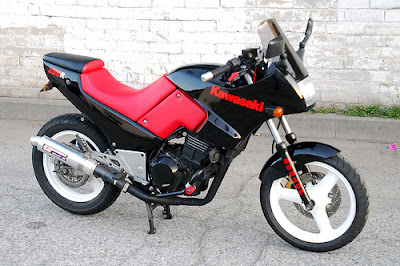All Rights Reserved © 2009 Thomas W. Day
The statement inspired me to look up the definition of the word "religion." My Webster’s says the word means “1) the service and worship of God or the supernatural, 2) commitment or devotion to religious faith or observance . . . 3) a personal set or institutionalized system of religious attitudes, beliefs, and practices, . . and 4) (my favorite although it’s “obsolete”) scrupulous conformity, or 5) a cause, principle, or system of beliefs held to with ardor and faith."
I don't get the religious connection and I'm not convinced that sane people would be religious about motorcycling. Of course, I'm not convinced that sane people are religious, by the above definition, about anything. "Scrupulous conformity" seems like a bad quality, don’t you think? Of course, it would be cherry-picking to point out that those “rebels” who dress in the same shade of black, ride the same bike brand decorated with predictable accessories, and parade in miles long trains of carbon-copy motorcycles are the poster boys and girls for “scrupulous conformity," I’m ashamed that you even thought about going there.
If you take the rational approach to motorcycling, form follows function and you don't have to be religious about the activity/sport/whateverthehellitis. Either your bike serves a function or it doesn't. If it doesn't, I guess you are religious. Personally, the only time I would willingly “share my joy with others” is when I am joyfully paying my bills. I would particularly like to share my medical insurance, mortgage, and utility bill-joy with any number of folks.
Today, I suspect quite a few motorcycles are aspects of religious activity. Those long “charity” parades are, apparently, examples of folks sharing the joy of loud noises and traffic congestion with a much larger portion of the population who would like to see that joy shared in someone else’s town. Ah, religion. Do any two people see the same heaven?
More than forty years ago, riding a dirt bike was a fairly practical activity, with no religious overtones. In Kansas, Texas, and Nebraska (in that order), I could ride my dirt bikes to work, across country (on or off road), and around town if I just used a little discretion regarding local laws and public opinion. I could, for instance, ride from central Nebraska to Valentine or Sidney or Red Cloud without spending more than a few miles on pavement (usually hunting a filling station) and with barely a consideration toward being fully street legal. I had lights, but no turn signals or horn or battery, but I was legally registered with plates. A few years earlier, I rode a Texas cross-country that started north of Amarillo and chased the Canadian River to just short of the New Mexico boarder, hobbling home more than 100 miles with only first through third gear still spinning on a Kawasaki Big Horn that only had a headlight and no license plate or registration. I had a couple of conversations with police that mostly involved questions regarding my own shredded appearance. Mostly, they wanted to know if I needed a doctor. Turned out, I’d probably suffered the first of my three or four clavicle breaks, but I didn’t know it until fifteen years later, the next time I broke that bone.
A friend, who grew up in west Texas in the 1920s, raced his brothers from Hereford to Amarillo, without ever seeing a road or anything resembling a town until they arrived at their favorite Amarillo bar and grill. They’d taken seriously the Indian “Scout” concept and used their bikes as quarter horses had been used fifty years earlier. This was long before commercial farming, city-sized cattle feedlots, and the Interstate came along to ruin a good thing.
Today, owning a dirt bike is a hard-to-explain, harder-to-justify consumptive hobby. You can’t ride the bike anywhere practical and you have to ferry your bike on or behind a cage to use it. The folks who still ride off-road are downright religious in their defense of the hobby, but it’s just a recreational vehicle and the “rights” of dirt bikers have pretty much eroded into infinitely small moments of geezers’ memories and are segregated onto narrow paths on small plots of public or private land. Even snowmobiles receive more practical transportation consideration than do dirt bikes.
A lot of street-legal bikes suffer the indignity we describe as “garage candy.” Fluffy, pointless design “art,” obsolete drive-train characteristics, and lots of farm-implement noise usually accompanies these toys and their owners do their best to irritate as many non-motorcyclists (the other 99.99. . .% of the public) so that they can drive motorcycling, in general, off of the roads and into transportation history.
Some folks pray to the highly polished, totally tricked out, road-race bikes that are occasionally used on public streets. If worshiping “false idols” is a sin, these boys and girls are serious sinners. They must be kneeling, scrubbing the oxides from their frames, all winter long and most summer weekdays to get this kind of shine out of a naturally dull metal like aluminum.
I probably don’t get it because I’m not inclined
that way. Beyond writing about riding and bike owning, I don’t do anything in
the service of motorcycling. Being on two wheels is my favorite means of
transportation, but transportation is mostly what my bike is to me. If I have to
travel between point A and point B, I’d rather do it on my motorcycle. My second
choice would be public transportation. My last choice would be in a car. If I’m
not going to be able to enjoy the trip, I’d rather not have to think about it at
all. But I’m not religious about it.









